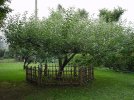آدم السطايفي، تم حظره "حظر دائم". السبب: مخالفة القوانين / عضوية مزدوجة
- تقول الأسطورة أن الشاب "إسحاق نيوتن" , كان جالساً تحت ظل شجرة التفاح , عندما وقعت على رأسه ثمرة تفاح , وحينها أكتشف الجاذبية الأرضية ..
- في الواقع الأمور لم تحدث على هذا النحو تماما ً !
ولد نيوتن عام 1642 , بالقرب من غرانثام , بإنجلترا , وهو إبن احد المزارعين ,ودخل جامعة كامبريدج عام 1661 ,وبعد اربع سنوات , وبعد تفشي وباء الطاعون الدملي , وأغلقت المدرسة مؤقتا لتفشي المرض , وكان على نيوتن ان ينتقل إلى منزل طفولته في Woolsthorpe Manor , وعند منزله ,كان هناك بستان ينمو فيه شجر التفاج , وكانت تسقط أمامه ثمار التفاح من على الأشجار , وليس هناك أدلة تشير إلى أن تفاحه سقطت على رأسه , ولكنه كان يراقب التفاح وهو يسقط , ويتسآل دائماً , لماذا يسقط التفاح دائماً بإتجاه الأرض , ولا يسقط جانباً أو إلى أعلى , وساعده هذا على إكتشاف قانون الجاذبية في نهاية المطاف .
- وفي 1687 , نشر نيوتن مبدأه للجاذبية والذي ينص على أنه " توجد قوة تجاذب بين أي جسمين في الكون، تتناسب طرديًا مع حاصل ضرب كتلتيهما، وعكسيًا مع مربع المسافة بين مركزيهم" , ثم بعد ذلك أنشأ قوانين الحركة الثلاثة المعروفة.
من أين جاءت قصة التفاحة ؟
- في 1726 , تقاسم نيوتن حكاية التفاحة مع السير ويليام ستوكلي ,وهو عالم آثار إنجليزي , حيث كتب ذلك في سيرة " مذكرات السير إسحق نيوتن" والتي نشرت في عام 1752 , حيث قال .. " بعد العشاء والطقس حار , ذهبنا إلى الحديقة , وشربنا الشاي سوياً تحت ظل بعض أشجار التفاح , قاله له إسحق نيوتن ,انه كان في مثل هذا الوضع , عندما جاءته فكرة الجاذبية , بسبب سقوط تفاحة بينما كان يجلس في مزاج تأملي " .
- توفي عالم الرياضيات والفيزياء "إسحق نيوتن" في عام 1727 , ودفن في كنيسة وستمنستر , بينما لا زالت شجرة التفاح الخاصة به على قيد الحياة في Woolsthorpe Manor حيث كان منزله .

شجرة تفاح اسحاق نيوتن
المصدر

Legend has it that a young Isaac Newton was sitting under an apple tree when he was bonked on the head by a falling piece of fruit, a 17th-century “aha moment” that prompted him to suddenly come up with his law of gravity. In reality, things didn’t go down quite like that. Newton, the son of a farmer, was born in 1642 near Grantham, England, and entered Cambridge University in 1661. Four years later, following an outbreak of the bubonic plague, the school temporarily closed, forcing Newton to move back to his childhood home, Woolsthorpe Manor. It was during this period at Woolsthorpe (Newton returned to Cambridge in 1667) that he was in the orchard there and witnessed an apple drop from a tree. There’s no evidence to suggest the fruit actually landed on his head, but Newton’s observation caused him to ponder why apples always fall straight to the ground (rather than sideways or upward) and helped inspired him to eventually develop his law of universal gravitation. In 1687, Newton first published this principle, which states that every body in the universe is attracted to every other body with a force that is directly proportional to the product of their masses and inversely proportional to the square of the distance between them, in his landmark work the “Principia,” which also features his three laws of motion.
In 1726, Newton shared the apple anecdote with William Stukeley, who included it in a biography, “Memoirs of Sir Isaac Newton’s Life,” published in 1752. According to Stukeley, “After dinner, the weather being warm, we went into the garden, & drank thea under the shade of some apple trees… he told me, he was just in the same situation, as when formerly, the notion of gravitation came into his mind…. occasion’d by the fall of an apple, as he sat in a contemplative mood.”
The esteemed mathematician and physicist died in 1727 and was buried at Westminster Abbey. His famous apple tree continues to grow at Woolsthorpe Manor
.


